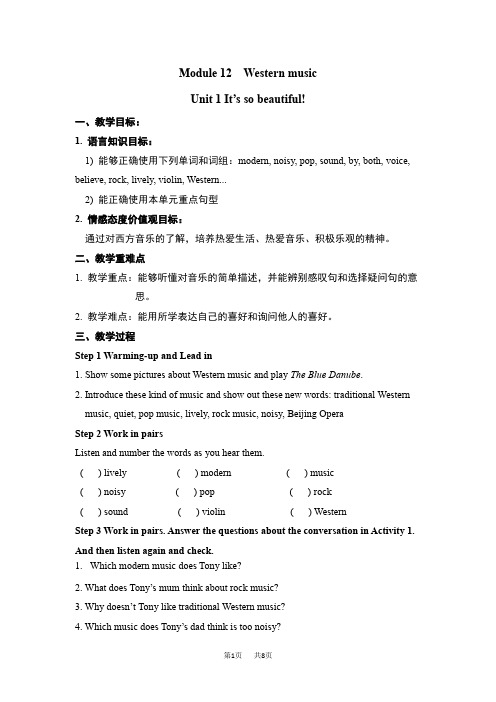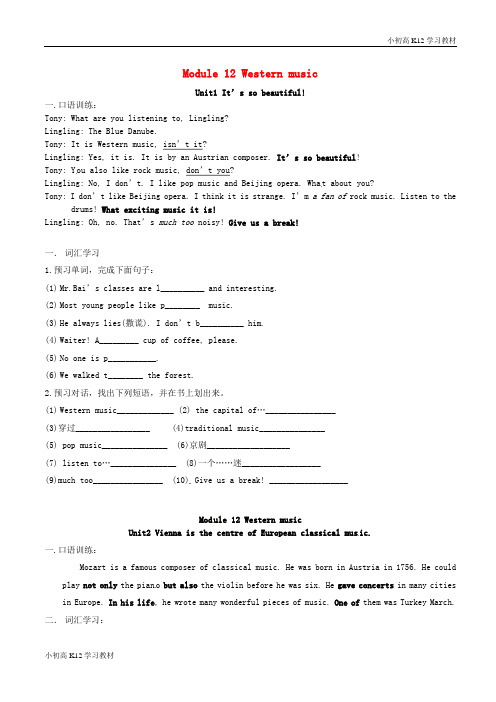【金榜学案】七年级英语下册 Module 12 Western music Unit 1课件 (新版)外研版
- 格式:ppt
- 大小:1.17 MB
- 文档页数:24

Module 12 Western musicUnit 1 It’s so beautiful !繁华周德玲课型:听说课【学习目标】1. 知识目标:掌握下列重点单词和词组的意思及用法pop, techno, beautiful, fun, lively,sad, serious, slow, traditional, sure, German, Austrian, composer, fan, on earth, noisy2.能力目标:能听懂别人对音乐的描述,辨别不同反意疑问句的意思,能表达自己的爱好,能用反意疑问句询问他人的喜好。
3.情感目标:通过对“同意”、“不同意”表达方式的训练,培养学生礼貌使用语言的意识与能力,在表达不同意见时照顾他人的感觉。
【教学重难点】:Do you like traditional Western music or pop music ?I like both.You listen to pop music , don’t you ?Yes, I do .【教学过程】[课前朗读]: 朗读classical, pop, rock, beautiful, fun, lively, sad, slow, traditional, German, Austrian, composer, fan, noisy, 根据音标读出单词并了解汉语意思,养成学生自主学习词汇的习惯,促使学生迅速进入学习状态。
[检查词汇预习]:a.学生结对、小组互查等形式来检查学生对词汇的预习情况。
b.朗读单词,注意发音。
一、情境导入教师可问学生:Do you like music? What types of music do you like? Who is your favourite composer? 这样会调动学生用英语思维的积极性,学生回答不一。
此时教师可向学生简单介绍音乐的种类,可介绍opera, rock music, rap, music等,引出You like western classical music, don’t you? 以此情境,导入本课。

七年级英语下册Module 12 Western music Unit 1 It’s so beautiful(第1课时)说课稿一. 教材分析《新目标英语》是一套全新的初中英语教材,以学生为中心,强调语言的实际运用能力。
七年级英语下册Module 12 Western music Unit 1 It’s so beautiful(第1课时)主要介绍了西方音乐,让学生了解和感受不同类型的音乐,提高他们的文化素养。
本节课的内容包括三部分:听力、口语和阅读。
通过本节课的学习,学生能够听懂、会说关于音乐类型的词汇,如classical music、rock music等,并能够运用这些词汇进行简单的交流。
二. 学情分析七年级的学生已经掌握了基本的英语语法和词汇,具备一定的听、说、读、写能力。
但是,对于西方音乐的了解还不够深入,部分学生可能对某些音乐类型存在偏见。
因此,在教学过程中,教师需要关注学生的个体差异,激发他们的学习兴趣,引导他们正确认识和欣赏各种类型的音乐。
三. 说教学目标1.知识目标:学生能够听懂、会说关于音乐类型的词汇,如classicalmusic、rock music等,并能够运用这些词汇进行简单的交流。
2.能力目标:学生能够听懂、会唱西方音乐,提高他们的音乐鉴赏能力。
3.情感目标:引导学生正确认识和欣赏各种类型的音乐,培养他们的文化素养。
四. 说教学重难点1.重点:学生能够听懂、会说关于音乐类型的词汇,并能够运用这些词汇进行简单的交流。
2.难点:学生能够听懂、会唱西方音乐,提高他们的音乐鉴赏能力。
五. 说教学方法与手段1.教学方法:采用任务型教学法,让学生在完成任务的过程中,掌握关于音乐类型的词汇,提高他们的听、说能力。
2.教学手段:利用多媒体课件、音频、视频等资源,为学生提供丰富的学习材料。
六. 说教学过程1.热身(5分钟):教师播放一首西方音乐,让学生猜测这首音乐的类型。
引导学生谈论自己喜欢的音乐,激发他们的学习兴趣。

Module 12 Western musicUnit 1 It’s so beautiful!一、教学目标:1. 语言知识目标:1) 能够正确使用下列单词和词组:modern, noisy, pop, sound, by, both, voice, believe, rock, lively, violin, Western...2) 能正确使用本单元重点句型2. 情感态度价值观目标:通过对西方音乐的了解,培养热爱生活、热爱音乐、积极乐观的精神。
二、教学重难点1. 教学重点:能够听懂对音乐的简单描述,并能辨别感叹句和选择疑问句的意思。
2. 教学难点:能用所学表达自己的喜好和询问他人的喜好。
三、教学过程Step 1 Warming-up and Lead in1. Show some pictures about Western music and play The Blue Danube.2. Introduce these kind of music and show out these new words: traditional Western music, quiet, pop music, lively, rock music, noisy, Beijing OperaStep 2 Work in pairsListen and number the words as you hear them.( ) lively ( ) modern ( ) music( ) noisy ( ) pop ( ) rock( ) sound ( ) violin ( ) WesternStep 3 Work in pairs. Answer the questions about the conversation in Activity 1. And then listen again and check.1.Which modern music does Tony like?2. What does Tony’s mum think about rock music?3. Why doesn’t Tony like traditional Western music?4. Which music does Tony’s dad think is too noisy?Step 4 Listen and read1. Listen and answer the question:(1) What is the name of the first piece of music?(2) Does Daming like rock music?2. Read and finish the exercises of Activity 4.1) They’re listening to Western music.2) Tony knows little about Strauss.3) Strauss was born in the capital of Australia.4) The Blue Danube is pop music.5) Lingling enjoys Beijing opera very much.3. Ask students to read the dialogue and try to find out some important sentences by themselves:(1)...this is Western music, isn’t it?(2)It’s so beautiful!(3)Is this by Strauss or Mozart?(4)What a beautiful city!(5) You listen to pop music, Lingling, don’t you?4.After the reading, have the students finish Activity5.1) Strauss wasn’t ______. He came from Austria.2) Daming thinks the ______ in rock music are too ______.3) Tony can’t ______ that Daming doesn’t like rock music.4) Betty likes ______ traditional Western music and pop music.5) Tony thinks the sound of the ______ in BeijingOpera is very different. Step 5 To study Everyday English.¤ What a beautiful city!¤ I’m a fan of rock music.¤ Give us a break!¤ I don’t believe it!Step 6 Complete the sentences about yourself.1. My favourite music is …2. I like it because ...3. My parents like ...Step 7 Speaking1. Listen and read.1)What a beautiful city!2)It’s so beautiful!3) I love his music!4) Listen to this!2. Work in pairs. Ask and answer the questions about the music you like or don’t like. — What music do you like?— I like pop. It’s lively and good to dance to, but I don’t like rock. It’s too noisy.What about you?Step 8 Language Points1. It goes through Vienna.through 意为“穿过,经过”,常与pass, go, walk 等动词连用。

外研版七年级下册英语《Module 12 Western music Unit 1》教学设计6一. 教材分析《Module 12 Western music Unit 1》主要介绍了西方音乐的历史和发展,包括不同时期的音乐风格和著名音乐家。
本节课的教学内容主要包括:音乐的基本元素(如节奏、旋律、和声等),不同音乐风格的特征(如古典、浪漫、现代等),以及西方著名音乐家的代表作品。
教材内容丰富,旨在培养学生对西方音乐的兴趣和认识,提高他们的音乐素养。
二. 学情分析七年级的学生对音乐有一定的兴趣和鉴赏能力,但西方音乐的历史和文化背景知识相对较为薄弱。
因此,在教学过程中,教师需要帮助学生建立起音乐与文化背景的联系,引导学生理解不同音乐风格的形成背景和发展趋势。
此外,学生对英语的学习兴趣和积极性也需要被激发,以便更好地投入到英语学习中。
三. 教学目标1.知识目标:–学生能够了解西方音乐的基本元素和不同音乐风格的特征。
–学生能够掌握西方著名音乐家的代表作品和生平事迹。
2.能力目标:–学生能够运用英语描述音乐的基本元素和不同音乐风格。
–学生能够通过听、说、读、写等多种方式,提高自己的英语综合运用能力。
3.情感目标:–学生能够培养对西方音乐的兴趣和鉴赏能力。
–学生能够在学习过程中,增强团队协作意识和自主学习能力。
四. 教学重难点•学生能够掌握西方音乐的基本元素和不同音乐风格的特征。
•学生能够运用英语描述音乐的基本元素和不同音乐风格。
•学生能够理解西方著名音乐家的代表作品和生平事迹。
•学生能够在实际情境中,运用英语进行音乐鉴赏和交流。
五. 教学方法1.任务型教学法:通过设计各种任务,让学生在实践中学习英语,提高他们的综合运用能力。
2.情境教学法:创设音乐相关的情境,让学生在真实的环境中感受和理解英语。
3.小组合作学习:鼓励学生之间进行合作交流,培养他们的团队协作能力和自主学习能力。
六. 教学准备1.教学材料:教材、多媒体课件、音乐资料等。

外研版英语七年级下英语《Module 12 Western music Unit 3》教学设计一. 教材分析本课是外研版英语七年级下册的Module 12 Western music Unit 3。
本单元的主题是西方音乐,主要介绍了一些著名的西方音乐家和他们的代表作品。
本课的内容包括:音乐家的简介、音乐家的代表作品、音乐家的成就等。
通过本课的学习,学生可以了解一些西方音乐家的生平事迹,提高自己的英语听力水平和口语表达能力。
二. 学情分析学生在之前的学习中已经掌握了一些西方文化的基本知识,对西方音乐也有一定的了解。
但是,学生的英语水平参差不齐,部分学生对英语的听说能力较弱。
因此,在教学过程中,需要关注学生的个体差异,尽量让每个学生都能参与到课堂活动中来。
三. 教学目标1.知识目标:–学生能够听懂、会说、会读本课的生词和短语。
–学生能够理解并运用本课所学的句子结构。
–学生能够了解一些西方音乐家的生平事迹和代表作品。
2.能力目标:–学生能够用英语进行简单的对话,提高自己的听说能力。
–学生能够通过查阅资料,了解更多关于西方音乐家的信息。
3.情感目标:–学生能够尊重不同的文化,增强自己的跨文化交际能力。
–学生能够培养对音乐的热爱,提高自己的生活品质。
四. 教学重难点•学生能够听懂、会说、会读本课的生词和短语。
•学生能够理解并运用本课所学的句子结构。
•学生能够用英语进行关于西方音乐家的生平事迹和代表作品的描述。
•学生能够通过查阅资料,了解更多关于西方音乐家的信息。
五. 教学方法1.任务型教学法:通过设计各种任务,让学生在完成任务的过程中,提高自己的英语听说能力和交际能力。
2.情境教学法:通过创设各种情境,让学生在真实的语言环境中,提高自己的英语运用能力。
3.合作学习法:通过小组合作,让学生在互动交流中,共同完成学习任务。
六. 教学准备1.教师准备:–教师需要熟悉教材内容,明确教学目标。
–教师需要准备相关的教学材料,如PPT、图片、视频等。

Module 12 Western musicUnit1 It’s so beautiful!一.口语训练:Tony: What are you listening to, Lingling?Lingling: The Blue Danube.Tony: It is Western music, isn’t it?Lingling: Yes, it is. It is by an Austrian composer. It’s so beautiful!Tony: Y ou also like rock music, don’t you?Lingling: No, I don’t. I like pop music and Beijing opera. What about you?Tony: I don’t like Beijing opera. I think it is strange. I’m a fan of rock music. Listen to the drums! What exciting music it is!Lingling: Oh, no. That’s much too noisy! Give us a break!一.词汇学习1.预习单词,完成下面句子:(1)Mr.Bai’s classes are l__________ and interesting.(2)Most young people like p________ music.(3)He always lies(撒谎). I don’t b__________ him.(4)Waiter! A_________ cup of coffee, please.(5)No one is p___________.(6)We walked t________ the forest.2.预习对话,找出下列短语,并在书上划出来。
Module 12 Western musicUnit 1 It’s so beautiful!Step1:Warming-up and Lead inTo give some pictures about Western singer to students. Such as Michael Jackson and the Musikverein in Vienna. Let them watch andtalk about them.Step3:Work in pairs. Answer the questions about the conversation in Activity 1. And then listen again and check.1.Which modern music does Tony like?2. What does Tony’s mum think about rock music?3. Why doesn’t Tony like traditional Westernmusic? 4. Which music does Tony’s dad think is too noisy?Keys: 1. He likes pop and rock music. 2. It’s lively. 3. It’s too slow. 4. He thinks pop music is too noisy.Step4:Listen and read the Activity 3. And then check (√) the true sentenc es.Keys: 1. √ 2. √ 3. × 4. × 5. √Step5:To study Everyday English.¤ What a beautiful city! ¤ I’m a fan of rock music. ¤ Give us a break! ¤ I don’t believeit!Step6:Check the types of music the students like (√) and don’tlike (x).believ e both drum German noisy voice1. Strauss wasn’t ______. He came from Austria.2. Daming thinks the ______ in rock music are too ______.3. Tony can’t ______ that Daming doesn’t like rock music.4. Betty likes ______ traditional Western music and pop music.5. Tony thinks the sound of the ___ in Beijing opera is very different. Keys: 1. German 2. drums; noisy 3. believe 4.both 5. voiceStep8:Work in pairs. Ask and answer the questions about the music you like or don’t like.— What music do you like? —I like pop. It’s lively and good to dance to, but I don’t like rock. It’s too noisy. What about you?Step11:Study the following new words.noisy, rock, sound, violin, through, both, voice, drum, lively, modern, pop (=popular), Western, hmm, by, opera, believeStep12:Explain and study the important and difficult points of Unit 1 Mo dule 12.1. noisy — quiet e.g. This city is not quiet, it’s noisy.2. Difference between “sound” and “voice”. e.g. At night she heard a strange sound. The girl has a sweet voice.3. The usage of word “by”. e.g. You can get there by bus. The piece is written by Mozart.4. Give us a break!Step13:Homework Review andrecite the imp ortant points of Unit 1.。
外研版七年级下册英语Module 12 Western music ◎第1课时Unit 1 It’s so beautiful!1. Y ou listen to pop music, Lingling, don’t you?玲玲,你听流行音乐,是吧?本句是反意疑问句。
反意疑问句由两部分组成,前一部分是对事实的陈述,后一部分是简短的提问。
反意疑问句的规则:前否后肯,前肯后否。
【例】You are a student, aren’t you?你是一名学生,是吗?2. It’s so noisy! And much too fast! 它太吵闹了!并且太快了!(1)noisy形容词,意为“吵闹的”。
其名词形式是noise,意为“噪音”。
【例】He is having a meeting now. Don’t be noisy. 他正在开会,不要吵闹。
(2)much too意为“太”,用来修饰形容词或副词。
【例】It’s much too hot outside.外面天气太热了。
3. Well, I like both.噢,我都喜欢。
both代词,意为“两个;两者”。
【例】Both are doctors.两个人都是医生。
【拓展】①both of…意为“……两者”,后接名词或代词的复数形式。
【例】Both of them are my friends.他们两个都是我的朋友。
②both…and…意为“……和……都”,连接并列的句子成分。
连接名词、代词作主语时,谓语动词用复数形式,【例】Both Tom and Tony are from Britain.汤姆和托尼都来自英国。
4. Give us a break!让我们清净一会儿吧!Give us/ me a break!常用于口语,意为“让我们/我清净一会儿吧!”,意在告诉对方停止做令自己烦恼的事情。
【例】Give me a break! I am tired.让我清净一下吧!我累了。
Module 12 Western music布置)学生课前准备:1. 预习词汇:noisy, rock, sound, violin, through, both, voice, drum, lively, modern, pop (=popular), Western, hmm, by, opera, believe, musician, centre (=center), century, European, composer, elder, waltz, poor, perfect, piece, classical, another, dance music和sad。
2. Class report教学课题: Module 12 Western music学习目标1. 语言知识目标:掌握下列单词: noisy, rock, sound, violin, through, both, voice, drum, lively, modern, pop (=popular), Western, hmm, by, opera, believe, musician, centre (=center), century, European, composer, elder, waltz, poor, perfect, piece, classical, another, dance music和sad。
2. 语言技能目标:1)能听懂谈论音乐的简单对话,能判断描述的事实。
2)能用感叹句表达自己的感受。
3)能够读懂简单的描写音乐的短文,掌握短文通篇大意,并学习使用上下文猜测词义的学习方法。
4)能用感叹句表达自己感受。
3. 情感目标:通过对西方音乐的了解,培养热爱生活、热爱音乐、积极乐观的精神。
教材分析外研版7年级英语下册Module 12 Western music units 1~3,本模块以西方音乐为题材,要求学生通过对西方音乐的了解,学习和掌握感叹句。